|
|
|
Sort Order |
|
|
|
Items / Page
|
|
|
|
|
|
|
| Srl | Item |
| 1 |
ID:
174152
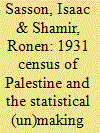

|
|
|
|
|
| Summary/Abstract |
This study sits at the intersection of census-making, colonialism, and the politics of statistical expertise. It considers the Palestine Census that the country’s British rulers had undertaken in 1931. It focuses on British intentions to include questions that could have yielded data about the alleged emergence of an Arab ‘landless class’. The validation of such a category would have justified British restrictions on Jewish immigration to Palestine. We trace the trajectory of ‘landlessness’ as a statistical category. We show that disparity in statistical expertise between Arab and Jewish experts, and a parity between Jewish and British experts, played a decisive role in shaping the census schedule. Consequently, Arab landlessness failed to become a valid statistical category. Our case highlights British census-making in India as a broad colonial model to be applied in other colonies and to be used as a scientific justification for Britain’s various political agendas.
|
|
|
|
|
|
|
|
|
|
|
|
|
|
|
|
| 2 |
ID:
146415
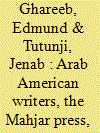

|
|
|
|
|
| Summary/Abstract |
This article reviews the attitudes of leading Arab Americans, as expressed in the Arab press in the United States (Sahafat Al-Mahjar as well as various anthologies in Arabic or English) toward Palestine, the Balfour Declaration, and the idea of a Jewish home in Palestine. The noted literary figure Mikhail Naimy sounded the alarm in 1915 (two years before the Balfour Declaration was issued) that moves were afoot to convert Palestine into a Jewish state, at the expense of the Palestinians, who, to his surprise, were strangely silent on the issue at the time. Another celebrated man of letters, Amin Rihani, was deeply engaged with the subject, and looked for avenues of reconciliation with variants of Zionism, except for “state-Zionism.” Rihani and others rose to the defense of Palestinians, particularly when they came under attack in the US press. Interestingly, one can trace an evolution in the thinking of the best writers among Arab Americans from total rejection of the Balfour Declaration toward the acceptance of a Jewish home in Palestine so long as it did not aspire to transform this haven (which appeared to have come into existence by the late thirties) from a refuge into a Jewish state.
|
|
|
|
|
|
|
|
|
|
|
|
|
|
|
|
| 3 |
ID:
158068
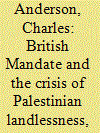

|
|
|
|
|
| Summary/Abstract |
This article examines landlessness among Palestinians as a facet of colonial policy in Mandate Palestine before the 1936 revolt. The growth of what was sometimes called a ‘landless class’ came into official view after the violence of 1929. Subsequent investigations indicated that landlessness was a significant problem and that it threatened to destabilize the Mandate. The effort to ameliorate the crisis of landlessness, however, clashed with the dominant colonial conception of settler developmentalism, the notion that Jews, not Arabs, were the agents of modern economic development in Palestine. The first part of this examination revisits the contest over the 1930 White Paper, focusing on its relationship to the advent of mass landlessness. The rapid defeat of the new policy via the MacDonald letter left the landlessness problem to fester while simultaneously obscuring it. As the situation in the Arab countryside continued to deteriorate, the onset of the fifth aliya temporarily reinforced erroneous assumptions about the potential to rectify the problem through the yishuv's development. By the time mass landlessness was ‘rediscovered’ and new land controls designed to protect Arab smallholders were on their way to promulgation in 1935–1936, the Palestinian countryside was just months away from determined revolt.
|
|
|
|
|
|
|
|
|
|
|
|
|
|
|
|
| 4 |
ID:
139520
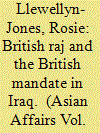

|
|
|
|
|
| Summary/Abstract |
Nearly a century before the 2003 invasion, the western powers, in the form of the British, were required to form a government of Iraq following the occupation of the region in the First World War. This government was led by personnel and doctrines which came not directly from western states, but from the British Raj of India. This article examines the historical links between Iraq and India, how Indian templates of government were imposed on Iraq by the British after the First World War, why these templates of government were ultimately ineffective for Iraq, and the long-term impact on Iraq of the pursuit of these methods of government.
|
|
|
|
|
|
|
|
|
|
|
|
|
|
|
|
| 5 |
ID:
131459


|
|
|
|
|
| Publication |
2014.
|
| Summary/Abstract |
This article critically assesses the conflict within the Orthodox Church of Jerusalem between the Greek hierarchy and the Arab laity concerning the proposals of the Mandatory Government for a new regulatory framework for patriarchal operation. The British presented two draft reform ordinances, neither of which met Arab expectations. Instead of promoting the laity's emancipation from 'foreign' Greek administrative and financial control, the ordinances left little room for a true inversion of the power structure between the two opposing camps, retaining the status quo at the expense of the Arab Orthodox rights.
|
|
|
|
|
|
|
|
|
|
|
|
|
|
|
|
| 6 |
ID:
179894
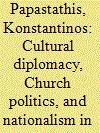

|
|
|
|
|
| Summary/Abstract |
The transition period from the Ottoman withdrawal from Jerusalem to the establishment of British rule was critical for the Orthodox Church. On the one hand, the rule of Patriarch Damianos was contested by a powerful opposition within the Brotherhood of the Holy Sepulchre, which was supported by the government in Athens. On the other hand, the Arab laity sided with Damianos, putting at the same time pressure on the new administration to upgrade its status both at a political and religious level. This paper attempts to contextually sketch out the historical course of events, paying special attention on the religious policy agenda of the new authorities, as well as the diplomatic and cultural factors influencing the decision-making process. Overall, the paper suggests that the internal church crisis under examination was determined by the historical reformulation caused by WWI, the development of Arab nationalism, national ambitions in Athens, and British local and diplomatic policy objectives. Moreover, it argues that this period of crisis should probably be viewed as the starting point of the modern history of the institution (This article extends and updates the analysis of my previous paper, Papastathis 2009 (in Greek). In particular, it employs and contextually analyses new archival sources from the Historic and Diplomatic Archive of the Greek Ministry of Foreign Affairs. The new archival material is related to the intra-religious background and institutional framework, and to the diplomatic and political aspects of the question under examination).
|
|
|
|
|
|
|
|
|
|
|
|
|
|
|
|
| 7 |
ID:
107914
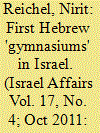

|
|
|
|
|
| Publication |
2011.
|
| Summary/Abstract |
This article traces the establishment and development of the first Hebrew 'gymnasiums' (academic high schools) during the years 1906-1948: Gymnasia Herzliya, the Hebrew Gymnasia in Jerusalem, and the Reali School in Haifa. It describes how they were set up during Ottoman rule, and their development during the British Mandate up to the establishment of the state, focusing on school culture as it was expressed in both the formal and informal educational systems.
|
|
|
|
|
|
|
|
|
|
|
|
|
|
|
|
| 8 |
ID:
141511
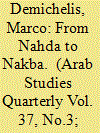

|
|
|
|
|
| Summary/Abstract |
The Governmental Arab College of Jerusalem is a little-known constructed space that emerged and then disappeared in just a few decades, a remarkable while extremely limited time if we reflect on the ancient history of the town that hosted it. However, it would be a great mistake not to consider these 30 years of history, from 1918 to 1948, and especially the wealth of cultural consciousness that the College was able to instill in its students. Ihsan Abbas (1920–2003), Ismail Ragib Khalidi (1916–1968), ‘Abdul Latif Tibawi (1910–1981), Irfan Shahid (1926) as academics, and Haidar Abdel Shafi (1919–2007), Halil-Salim Jabara (1913–1999), Hasib Sabbagh (1920–2010) etc. as politicians and activists are some of the most important names in Arab Palestinian culture and politics of the twentieth century, and all of them studied at the Arab College of Jerusalem. In this article, I would like to focus attention on the importance of this secondary/preparatory school, the social and cultural values that the teaching body was able to impart, and the role it played within the increasing and violent debate that the Arab College ignited concerning the growing Arab Palestinian-Jewish conflict in the first half of the twentieth century under the British Mandate. The Palestinian intelligentsia that was shaped within the Arab College symbolizes a cultural elite that, even if it would learn what it means to live as refugees, continued to work in different ways on its own cultural tradition. A key subject in understanding the main reasons behind the roots of identity within this divided city.
|
|
|
|
|
|
|
|
|
|
|
|
|
|
|
|
| 9 |
ID:
173355
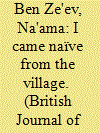

|
|
|
|
|
| Summary/Abstract |
During the Mandate period (1920–1948), Haifa attracted thousands of Palestinian rural migrants, who constituted a significant portion of its Arab population. The article examines the experience of rural migrants in urban life and the influence of this social group on urban society. I argue that rural migrants contributed to Haifa’s economic development, participated in political and cultural activity and formed a connecting link between the city and their villages of origin. Rural migrants played a significant role as agents of change in Palestinian society, owing to the conjunction of rural and urban characteristics in their daily life. To demonstrate this, I focus on three arenas of their agency: the labour market, civil society and militias during the Arab Revolt. Their involvement in civil associations and in the Arab Revolt was central to their construction of modernity, and they disseminated it in widening circles in their villages of origin and among their acquaintances in the city.
|
|
|
|
|
|
|
|
|
|
|
|
|
|
|
|
| 10 |
ID:
165585
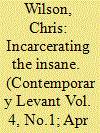

|
|
|
|
|
| Summary/Abstract |
Although much has been written about counterinsurgency, policing, and incarceration under the British mandate in Palestine, little work has been done on those who entered the ambit of the carceral system as ‘criminal lunatics’. Criminal lunatics – the term used at the time to specifically designate those found ‘guilty but insane’ by the mandate’s criminal courts, and retained throughout this article both for the sake of analytic clarity and to avoid misdiagnosing individuals by the retrospective imposition of contemporary medical terms – confounded the mandatory government by potentially falling under the responsibility of both its criminal-legal and medical wings. While the focus in the wider scholarship on psychiatry has often been on its expansionist appetites, the struggle over responsibility for criminal lunatics in mandate Palestine offers a case study in the reverse; an attempt to abdicate, not aggrandise, as the health department staved off repeated efforts to make them take responsibility for these cases. This article traces these disputes, and the development of a distinct institutional landscape attendant on their outcome. But the fate of criminal lunatics was not merely determined by debates internal to government; families were important interlocutors too, who variously sought the release of their incarcerated mentally ill relatives, or – more worryingly for the mandate – exploited the criminal-legal system as a back-door to the overcrowded and underfunded government mental institutions. Far from seeing psychiatry as a tool of social control, the government expressed concern about the potential misuse of psychiatric ideas, processes, and institutions by Palestinian families as a way to escape obligations to mentally ill relatives. Foregrounding these fraught contestations brings into focus the sharp limits of the mandate’s ambitions in the sphere of the intimate, and the attempts of some Palestinians to expand those limits for their own ends.
|
|
|
|
|
|
|
|
|
|
|
|
|
|
|
|
| 11 |
ID:
193983


|
|
|
|
|
| Summary/Abstract |
The transition from life under Ottoman rule to life under the Iraqi Kingdom established in 1921 marked a positive shift in the fortunes of the country’s Jewish community. During the British mandate for Iraq (1921–32), the Jews enjoyed equal rights and were economically and socially integrated into Muslim society. However, with the end of the mandate and the acceptance of Iraq’s independence, a process of restricting the Jews and physically harming them began, culminating in the pogrom (known as the Farhud) of June 1941. During the decade attending the Farhud, the Iraqi government linked the fate of the Jewish community to that of the Palestinian Arabs. The state pursued a policy of oppression and discrimination, which eventually led to the displacement of the country’s Jewish community from a place it had called home for thousands of years.
|
|
|
|
|
|
|
|
|
|
|
|
|
|
|
|
| 12 |
ID:
148625
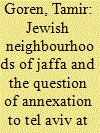

|
|
|
|
|
| Summary/Abstract |
One of the most complex issues facing British rule on the local municipal level towards the end of the Mandate period was the problem of Jaffa's Jewish neighbourhoods. This question, which emerged with the outbreak of the 1936 disturbances, engaged the government thereafter until the end of the Mandate. The demand by the residents of Jaffa's Jewish neighbourhoods for annexation to Tel Aviv – actually for municipal detachment from Jaffa – constituted the root of the problem. In this setting of the sharpening of relations between the authorities and the Jews and Arabs in 1945–1947, all three involved parties found themselves deeply immersed in it in the attempt to bring about its resolution. The annexation problem ceaselessly preoccupied the institutions of the Jewish Yishuv as a Zionist–Yishuv struggle of the highest order. This period gave rise to a series of unprecedented moves by the Jewish side, which were intended to influence the British government toward solving the problem. The article examines its development of the problem from the viewpoint of the three sides concerned in the years 1945–1947, with the focus on the policy line adopted by the Jewish side, its implications and its results.
|
|
|
|
|
|
|
|
|
|
|
|
|
|
|
|
| 13 |
ID:
124367
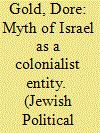

|
|
|
|
|
| Publication |
2011.
|
| Summary/Abstract |
While modern Israel was born in the aftermath of the British Mandate for Palestine, which called for a Jewish national home, its roots preceded the arrival of the British to the Middle East. In that sense Britain was not Israel's mother-country, like France was for Algeria. Indeed, the Jews were already reestablishing their presence independently in their land well before the British and French dismantled the Ottoman Empire. As time went on, it became clear that the British Empire was not the handmaiden of Israel's re-birth, but rather its main obstacle. The accusation that Israel has colonialist roots because of its connection to the British Mandate is ironic, since most of the Arab states owe their origins to the entry and domination of the European powers.
|
|
|
|
|
|
|
|
|
|
|
|
|
|
|
|
| 14 |
ID:
169984
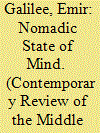

|
|
|
|
|
| Summary/Abstract |
This article is based on over a decade of field research among Bedouin tribes of the Negev as well as historical and geographical research. Its central argument is that the main social, cultural, and geographical processes within the Negev Bedouin groups are impacted by three major forces: nomadism and the social structure; formal Islam; and the rise of the modern state. This argument is illustrated by the geographical concept of “mental maps”, and its various manifestations in Bedouin society. The article focuses on the historical developments of the twentieth century, which took place alongside the rise of the Zionist movement and the establishment of the State of Israel.
|
|
|
|
|
|
|
|
|
|
|
|
|
|
|
|
| 15 |
ID:
171311


|
|
|
|
|
| Summary/Abstract |
During the final years of Ottoman rule and the three decades of British rule, Palestine witnessed the emergence of a community of professionally trained Palestinian Arab doctors. This study traces the evolution of the medical profession in Palestine against the background of the shifting cultural and symbolic capital of an expanding urban middle class and the educational possibilities that enabled this development. Palestinian Arab doctors are examined through a number of interconnected prisms: their activity in social, political, and professional regional networks, their modus operandi under British colonial rule, their response to Zionism and its accompanying influx of immigrant Jewish doctors, and their ability to mobilize collectively under a shared national vision.
|
|
|
|
|
|
|
|
|
|
|
|
|
|
|
|
| 16 |
ID:
165584
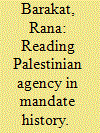

|
|
|
|
|
| Summary/Abstract |
Posited as ‘post-national’ and articulated as ‘relational,’ recent historiography of the mandate period has had a long-term effect on how we read (and have been warned not to read) nationalism and resistance in Palestine. Beyond a critical survey of a select part of this recent historical literature, this essay shows how the question of nationalism has been framed in only one way and towards one end. Using this critical reading of the historical literature, this essay further attempts to open up space for a means of understanding Indigenous nationalism (and indigenous resistance) outside of the confined space of this particular treatment of nation-state nationalism. I suggest we move towards exploring an indigenous epistemological understanding of ‘history as story telling’ outside of these Zionist ontological constraints.
|
|
|
|
|
|
|
|
|
|
|
|
|
|
|
|
| 17 |
ID:
161901
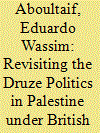

|
|
|
|
|
| Summary/Abstract |
There is an established literature which argues that the Druze of Palestine were either neutral during the Colonial period or supportive of the Zionist Agency and its plans. The aim of this research is to counter the Zionist narratives that promote the concept of Druze–Zionist cooperation. I argue that the Druze were supportive of the Palestinian-Arab cause, and they heavily participated in the anti-colonial activities of the Palestinians, politically and militarily. Their military participation was manifested in their participation in the events of 1929, 1936, and 1948. Politically, Sheikh Amin Tarif led the community in their stance against Zionism. This research will provide a new account and narrative for the Druze role in the events in mandatory Palestine, revealing their supportive stance to the Palestinian national struggle.
|
|
|
|
|
|
|
|
|
|
|
|
|
|
|
|
| 18 |
ID:
177685
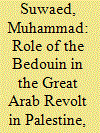

|
|
|
|
|
| Summary/Abstract |
This article focuses on the Bedouins’ part in the Great Arab Revolt in Palestine – during the time of the British mandate; what motivated some clans/tribes to join a given side, and why others chose to remain neutral – and it also refers to the later implications of these different choices. The article briefly overviews the social and political developments that led to the Revolt, explains the unique status of the Bedouin within the Arabic-speaking population in the area, and describes the internal diversity among Bedouin groups and the different alliances they made with the British Mandatory authorities and with other segments of the population.
|
|
|
|
|
|
|
|
|
|
|
|
|
|
|
|
| 19 |
ID:
142761
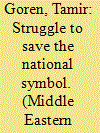

|
|
|
|
|
| Summary/Abstract |
The outbreak of the Arab revolt marked the start of the continuous economic decline of Jaffa, which hitherto had been known as an outstanding and flourishing economic centre. The decisive factor that highlighted above all others the city's economic deterioration was the decline of its port. This carried notable moral implication for the Arab public, as Jaffa port, the city's symbol and legacy, was deemed a national emblem and a foundation stone of the Palestinian Arab economy. Its decline from 1936 onwards instigated a bitter struggle to restore it to its halcyon days. The article examines the measures taken by the local Arab leadership bodies and by the Arab Higher Committee to resurrect the port and its status, from the outbreak of the 1936 disturbances until the war that broke out in 1947.
|
|
|
|
|
|
|
|
|
|
|
|
|
|
|
|
| 20 |
ID:
189545
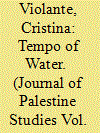

|
|
|
|
|
| Summary/Abstract |
During the Mandate period, Palestinian rural communities often shared their water sources proportionally in time-based rotations. Water use functioned as a temporal marker, embedded in the tempo of daily life. This article contrasts this way of distributing water with that of Zionist settlers and the British Mandatory administration, which typically measured water use in terms of volume. Volume-based measures, used by the British and by Zionist settlers, facilitated the commodification of water, transforming it into an object of investment for the development of colonial infrastructure, most notably irrigation and electricity. Time-based rotations, in contrast, were anchored in the movement of the sun and planets, seasonality (dry vs. wet season), and the needs of the community as a whole. The two approaches reflect different ways of relating to the environment and the natural world. Therefore, Zionist dispossession of water resources was not merely material, but it disrupted communal practices and obscured their associated temporalities.
|
|
|
|
|
|
|
|
|
|
|
|
|
|
|
|
|
|
|
|
|